International Law Report: Self-Determination vs Non-Intervention
VerifiedAdded on 2020/05/08
|61
|16185
|80
Report
AI Summary
This report delves into the core principles of international law, specifically focusing on self-determination and non-intervention. It examines these principles within the context of the UN Charter, exploring their significance in regulating state relations, upholding human rights, and maintaining international peace and security. The research methodology includes an interpretivist research philosophy with a descriptive research design and a deductive research strategy. The report covers the legal aspects of international intervention, the promotion of self-determination, and the impact of these principles on global affairs. It analyzes the tensions between respecting state sovereignty and the right to self-determination, considering the roles of international practice, the UN, and other international actors. The report concludes with a discussion of the challenges and developments in implementing these fundamental international legal principles, emphasizing their role in safeguarding human rights and ensuring international stability.
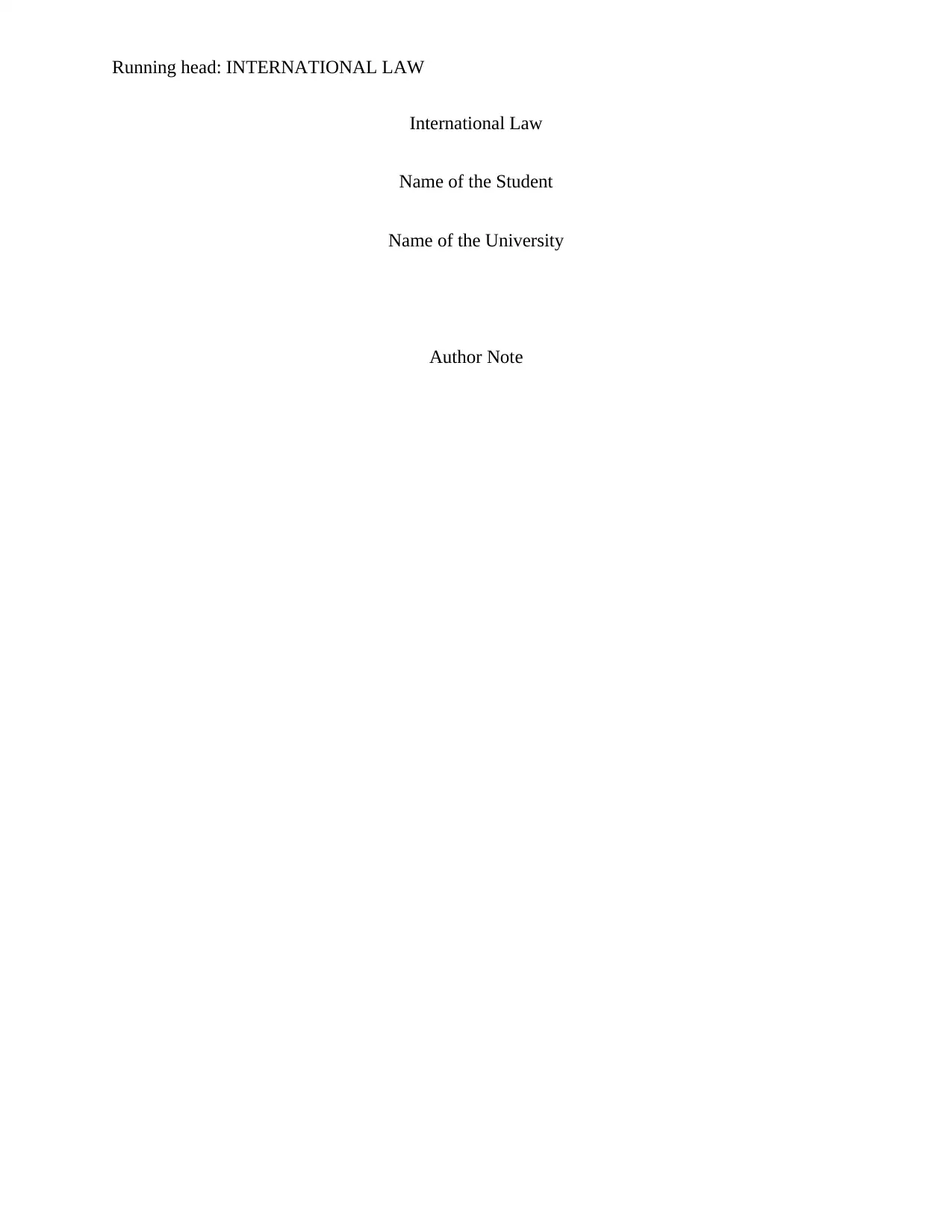
Running head: INTERNATIONAL LAW
International Law
Name of the Student
Name of the University
Author Note
International Law
Name of the Student
Name of the University
Author Note
Paraphrase This Document
Need a fresh take? Get an instant paraphrase of this document with our AI Paraphraser
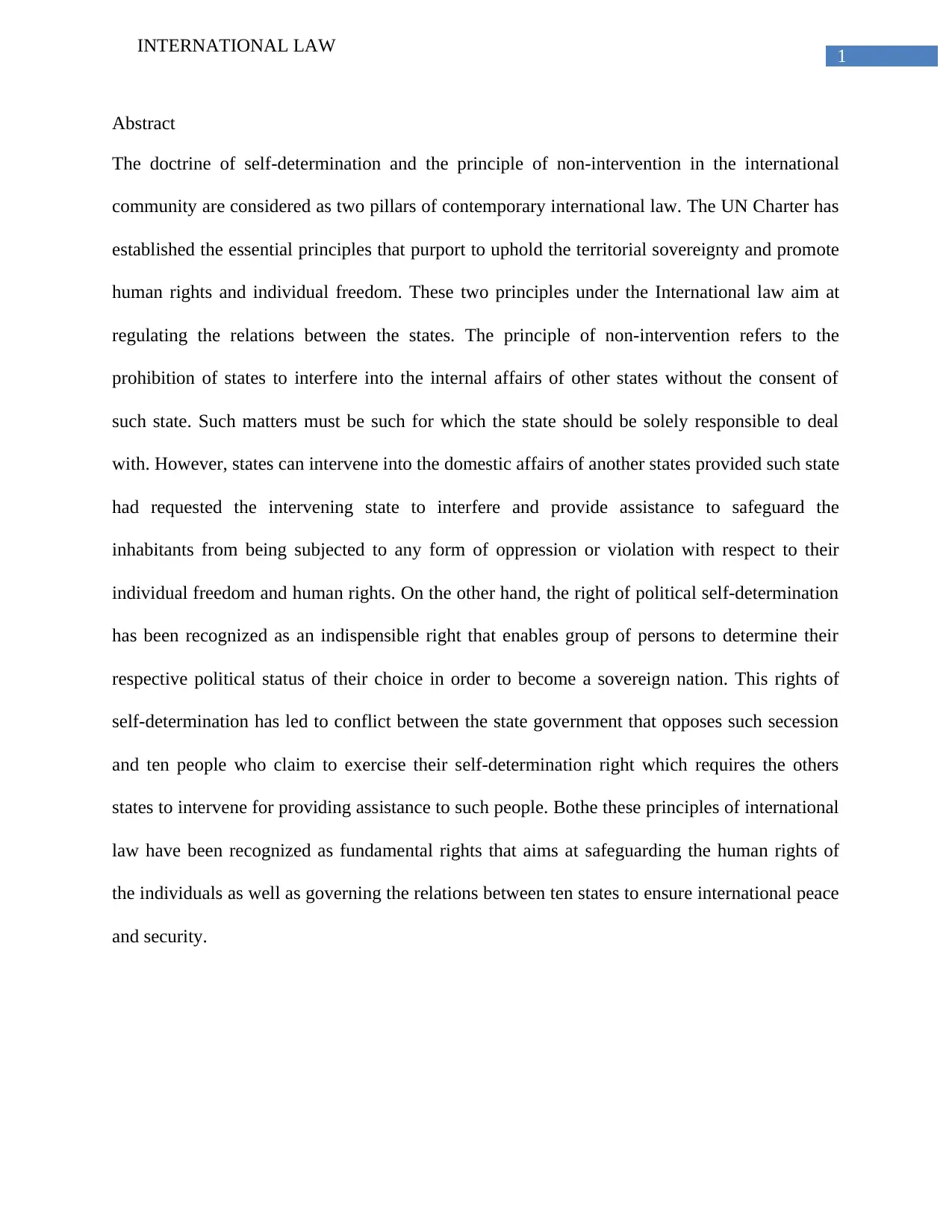
1
INTERNATIONAL LAW
Abstract
The doctrine of self-determination and the principle of non-intervention in the international
community are considered as two pillars of contemporary international law. The UN Charter has
established the essential principles that purport to uphold the territorial sovereignty and promote
human rights and individual freedom. These two principles under the International law aim at
regulating the relations between the states. The principle of non-intervention refers to the
prohibition of states to interfere into the internal affairs of other states without the consent of
such state. Such matters must be such for which the state should be solely responsible to deal
with. However, states can intervene into the domestic affairs of another states provided such state
had requested the intervening state to interfere and provide assistance to safeguard the
inhabitants from being subjected to any form of oppression or violation with respect to their
individual freedom and human rights. On the other hand, the right of political self-determination
has been recognized as an indispensible right that enables group of persons to determine their
respective political status of their choice in order to become a sovereign nation. This rights of
self-determination has led to conflict between the state government that opposes such secession
and ten people who claim to exercise their self-determination right which requires the others
states to intervene for providing assistance to such people. Bothe these principles of international
law have been recognized as fundamental rights that aims at safeguarding the human rights of
the individuals as well as governing the relations between ten states to ensure international peace
and security.
INTERNATIONAL LAW
Abstract
The doctrine of self-determination and the principle of non-intervention in the international
community are considered as two pillars of contemporary international law. The UN Charter has
established the essential principles that purport to uphold the territorial sovereignty and promote
human rights and individual freedom. These two principles under the International law aim at
regulating the relations between the states. The principle of non-intervention refers to the
prohibition of states to interfere into the internal affairs of other states without the consent of
such state. Such matters must be such for which the state should be solely responsible to deal
with. However, states can intervene into the domestic affairs of another states provided such state
had requested the intervening state to interfere and provide assistance to safeguard the
inhabitants from being subjected to any form of oppression or violation with respect to their
individual freedom and human rights. On the other hand, the right of political self-determination
has been recognized as an indispensible right that enables group of persons to determine their
respective political status of their choice in order to become a sovereign nation. This rights of
self-determination has led to conflict between the state government that opposes such secession
and ten people who claim to exercise their self-determination right which requires the others
states to intervene for providing assistance to such people. Bothe these principles of international
law have been recognized as fundamental rights that aims at safeguarding the human rights of
the individuals as well as governing the relations between ten states to ensure international peace
and security.
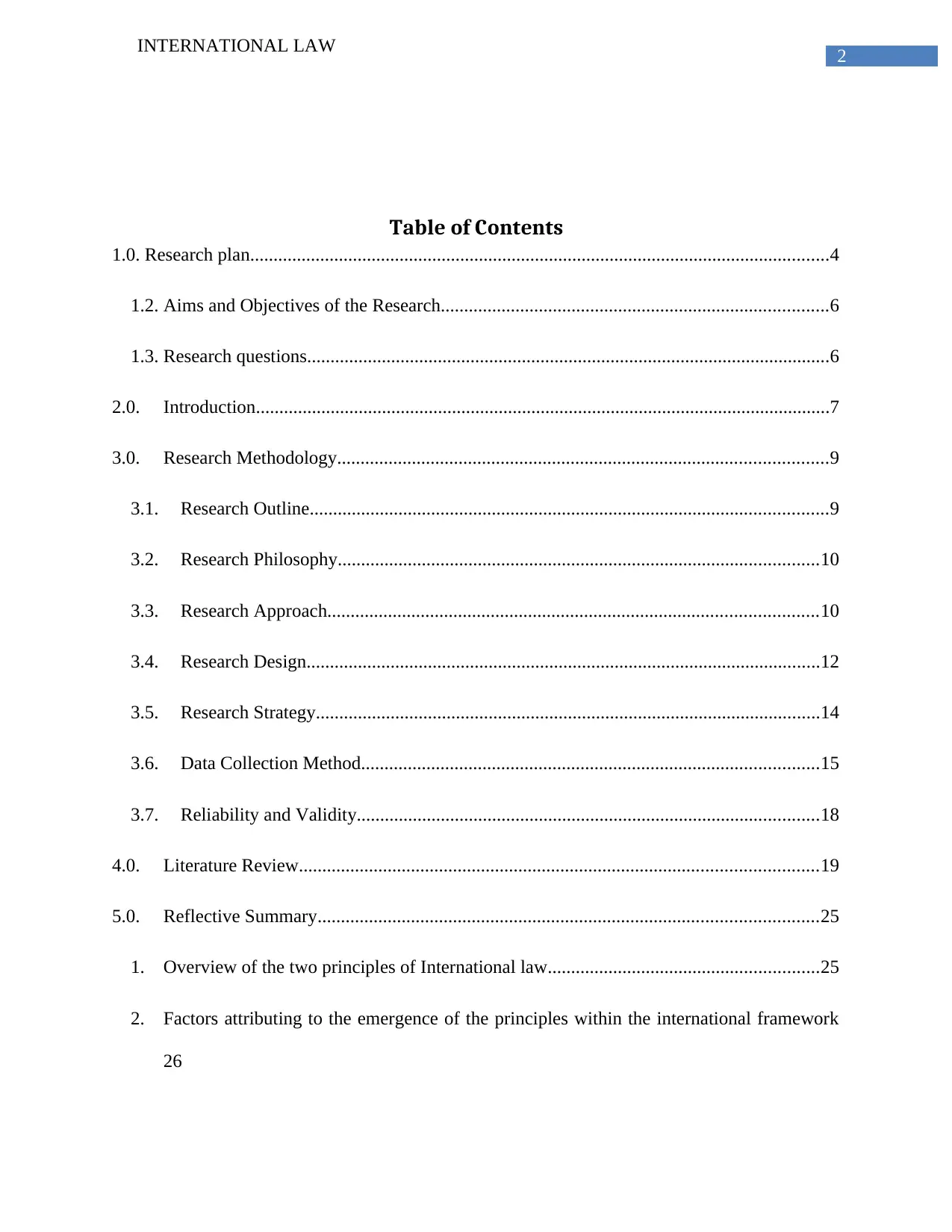
2
INTERNATIONAL LAW
Table of Contents
1.0. Research plan............................................................................................................................4
1.2. Aims and Objectives of the Research...................................................................................6
1.3. Research questions................................................................................................................6
2.0. Introduction...........................................................................................................................7
3.0. Research Methodology.........................................................................................................9
3.1. Research Outline...............................................................................................................9
3.2. Research Philosophy.......................................................................................................10
3.3. Research Approach.........................................................................................................10
3.4. Research Design..............................................................................................................12
3.5. Research Strategy............................................................................................................14
3.6. Data Collection Method..................................................................................................15
3.7. Reliability and Validity...................................................................................................18
4.0. Literature Review...............................................................................................................19
5.0. Reflective Summary...........................................................................................................25
1. Overview of the two principles of International law..........................................................25
2. Factors attributing to the emergence of the principles within the international framework
26
INTERNATIONAL LAW
Table of Contents
1.0. Research plan............................................................................................................................4
1.2. Aims and Objectives of the Research...................................................................................6
1.3. Research questions................................................................................................................6
2.0. Introduction...........................................................................................................................7
3.0. Research Methodology.........................................................................................................9
3.1. Research Outline...............................................................................................................9
3.2. Research Philosophy.......................................................................................................10
3.3. Research Approach.........................................................................................................10
3.4. Research Design..............................................................................................................12
3.5. Research Strategy............................................................................................................14
3.6. Data Collection Method..................................................................................................15
3.7. Reliability and Validity...................................................................................................18
4.0. Literature Review...............................................................................................................19
5.0. Reflective Summary...........................................................................................................25
1. Overview of the two principles of International law..........................................................25
2. Factors attributing to the emergence of the principles within the international framework
26
⊘ This is a preview!⊘
Do you want full access?
Subscribe today to unlock all pages.

Trusted by 1+ million students worldwide
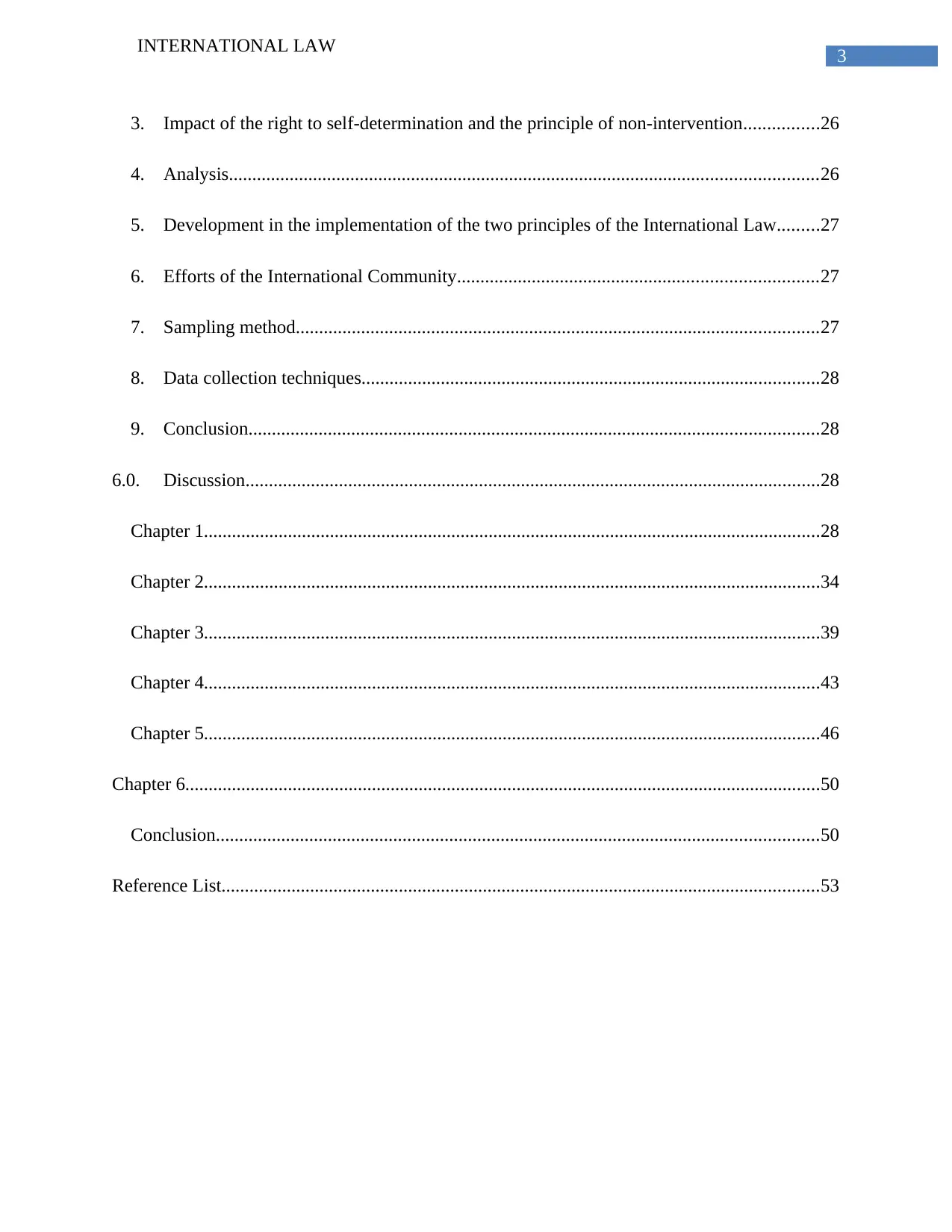
3
INTERNATIONAL LAW
3. Impact of the right to self-determination and the principle of non-intervention................26
4. Analysis..............................................................................................................................26
5. Development in the implementation of the two principles of the International Law.........27
6. Efforts of the International Community.............................................................................27
7. Sampling method................................................................................................................27
8. Data collection techniques..................................................................................................28
9. Conclusion..........................................................................................................................28
6.0. Discussion...........................................................................................................................28
Chapter 1....................................................................................................................................28
Chapter 2....................................................................................................................................34
Chapter 3....................................................................................................................................39
Chapter 4....................................................................................................................................43
Chapter 5....................................................................................................................................46
Chapter 6........................................................................................................................................50
Conclusion.................................................................................................................................50
Reference List................................................................................................................................53
INTERNATIONAL LAW
3. Impact of the right to self-determination and the principle of non-intervention................26
4. Analysis..............................................................................................................................26
5. Development in the implementation of the two principles of the International Law.........27
6. Efforts of the International Community.............................................................................27
7. Sampling method................................................................................................................27
8. Data collection techniques..................................................................................................28
9. Conclusion..........................................................................................................................28
6.0. Discussion...........................................................................................................................28
Chapter 1....................................................................................................................................28
Chapter 2....................................................................................................................................34
Chapter 3....................................................................................................................................39
Chapter 4....................................................................................................................................43
Chapter 5....................................................................................................................................46
Chapter 6........................................................................................................................................50
Conclusion.................................................................................................................................50
Reference List................................................................................................................................53
Paraphrase This Document
Need a fresh take? Get an instant paraphrase of this document with our AI Paraphraser
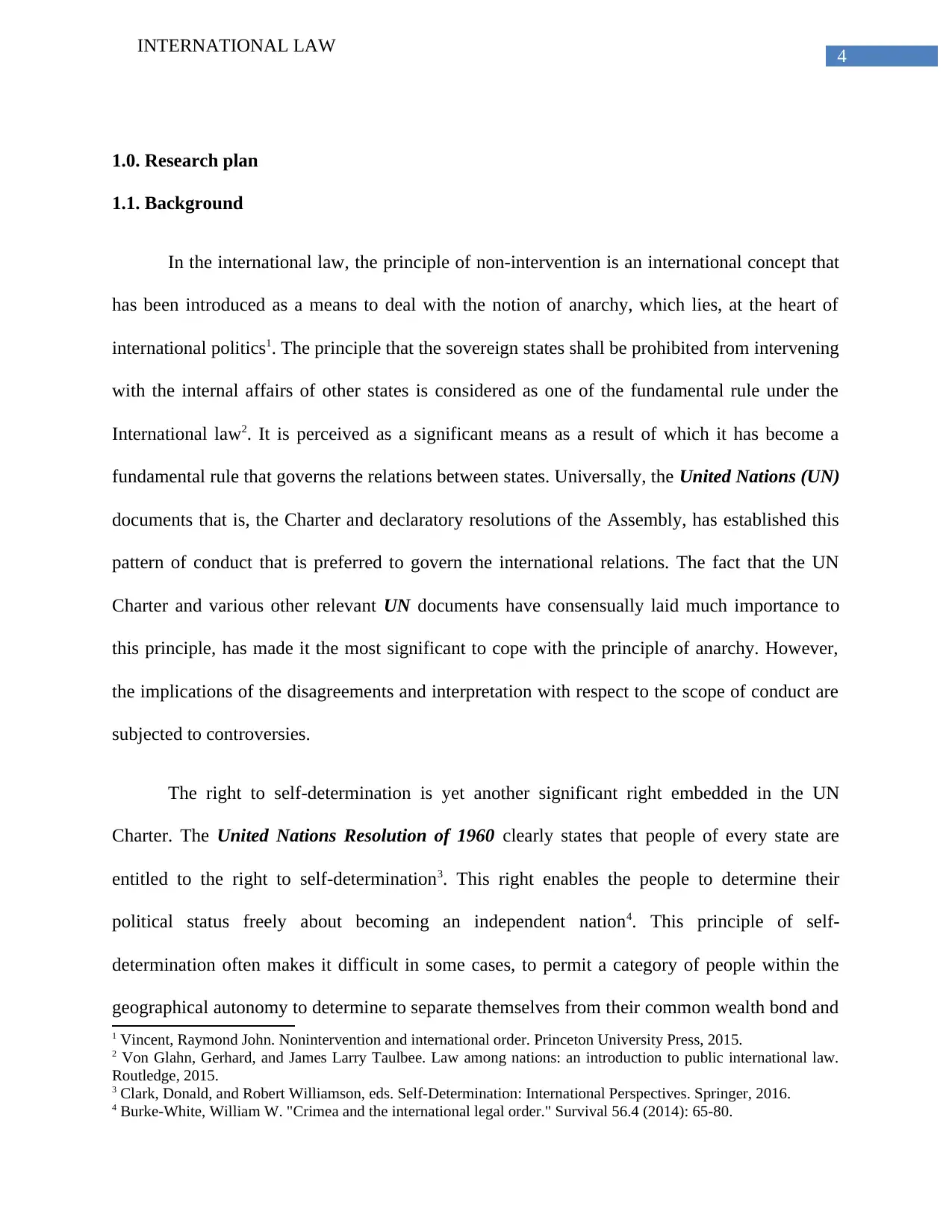
4
INTERNATIONAL LAW
1.0. Research plan
1.1. Background
In the international law, the principle of non-intervention is an international concept that
has been introduced as a means to deal with the notion of anarchy, which lies, at the heart of
international politics1. The principle that the sovereign states shall be prohibited from intervening
with the internal affairs of other states is considered as one of the fundamental rule under the
International law2. It is perceived as a significant means as a result of which it has become a
fundamental rule that governs the relations between states. Universally, the United Nations (UN)
documents that is, the Charter and declaratory resolutions of the Assembly, has established this
pattern of conduct that is preferred to govern the international relations. The fact that the UN
Charter and various other relevant UN documents have consensually laid much importance to
this principle, has made it the most significant to cope with the principle of anarchy. However,
the implications of the disagreements and interpretation with respect to the scope of conduct are
subjected to controversies.
The right to self-determination is yet another significant right embedded in the UN
Charter. The United Nations Resolution of 1960 clearly states that people of every state are
entitled to the right to self-determination3. This right enables the people to determine their
political status freely about becoming an independent nation4. This principle of self-
determination often makes it difficult in some cases, to permit a category of people within the
geographical autonomy to determine to separate themselves from their common wealth bond and
1 Vincent, Raymond John. Nonintervention and international order. Princeton University Press, 2015.
2 Von Glahn, Gerhard, and James Larry Taulbee. Law among nations: an introduction to public international law.
Routledge, 2015.
3 Clark, Donald, and Robert Williamson, eds. Self-Determination: International Perspectives. Springer, 2016.
4 Burke-White, William W. "Crimea and the international legal order." Survival 56.4 (2014): 65-80.
INTERNATIONAL LAW
1.0. Research plan
1.1. Background
In the international law, the principle of non-intervention is an international concept that
has been introduced as a means to deal with the notion of anarchy, which lies, at the heart of
international politics1. The principle that the sovereign states shall be prohibited from intervening
with the internal affairs of other states is considered as one of the fundamental rule under the
International law2. It is perceived as a significant means as a result of which it has become a
fundamental rule that governs the relations between states. Universally, the United Nations (UN)
documents that is, the Charter and declaratory resolutions of the Assembly, has established this
pattern of conduct that is preferred to govern the international relations. The fact that the UN
Charter and various other relevant UN documents have consensually laid much importance to
this principle, has made it the most significant to cope with the principle of anarchy. However,
the implications of the disagreements and interpretation with respect to the scope of conduct are
subjected to controversies.
The right to self-determination is yet another significant right embedded in the UN
Charter. The United Nations Resolution of 1960 clearly states that people of every state are
entitled to the right to self-determination3. This right enables the people to determine their
political status freely about becoming an independent nation4. This principle of self-
determination often makes it difficult in some cases, to permit a category of people within the
geographical autonomy to determine to separate themselves from their common wealth bond and
1 Vincent, Raymond John. Nonintervention and international order. Princeton University Press, 2015.
2 Von Glahn, Gerhard, and James Larry Taulbee. Law among nations: an introduction to public international law.
Routledge, 2015.
3 Clark, Donald, and Robert Williamson, eds. Self-Determination: International Perspectives. Springer, 2016.
4 Burke-White, William W. "Crimea and the international legal order." Survival 56.4 (2014): 65-80.
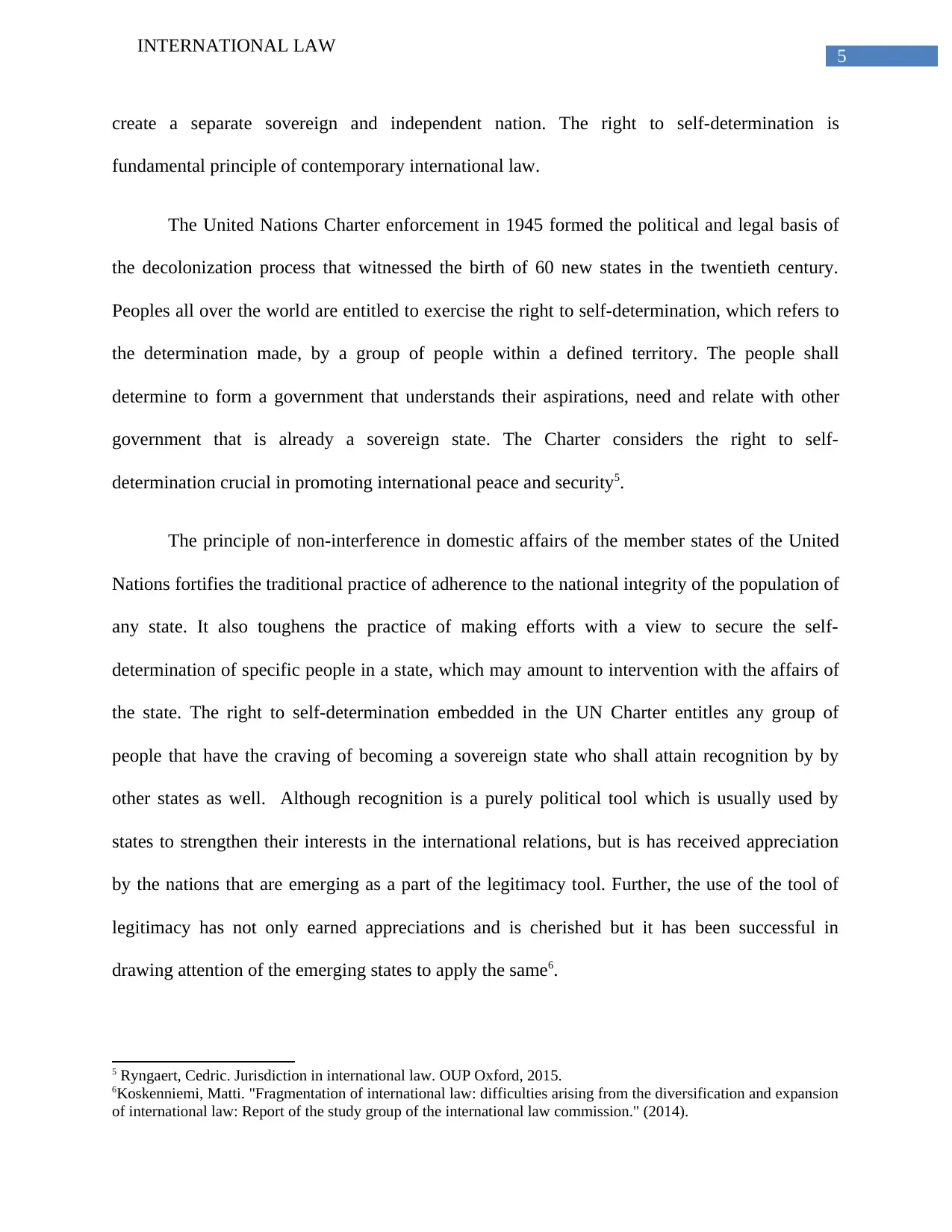
5
INTERNATIONAL LAW
create a separate sovereign and independent nation. The right to self-determination is
fundamental principle of contemporary international law.
The United Nations Charter enforcement in 1945 formed the political and legal basis of
the decolonization process that witnessed the birth of 60 new states in the twentieth century.
Peoples all over the world are entitled to exercise the right to self-determination, which refers to
the determination made, by a group of people within a defined territory. The people shall
determine to form a government that understands their aspirations, need and relate with other
government that is already a sovereign state. The Charter considers the right to self-
determination crucial in promoting international peace and security5.
The principle of non-interference in domestic affairs of the member states of the United
Nations fortifies the traditional practice of adherence to the national integrity of the population of
any state. It also toughens the practice of making efforts with a view to secure the self-
determination of specific people in a state, which may amount to intervention with the affairs of
the state. The right to self-determination embedded in the UN Charter entitles any group of
people that have the craving of becoming a sovereign state who shall attain recognition by by
other states as well. Although recognition is a purely political tool which is usually used by
states to strengthen their interests in the international relations, but is has received appreciation
by the nations that are emerging as a part of the legitimacy tool. Further, the use of the tool of
legitimacy has not only earned appreciations and is cherished but it has been successful in
drawing attention of the emerging states to apply the same6.
5 Ryngaert, Cedric. Jurisdiction in international law. OUP Oxford, 2015.
6Koskenniemi, Matti. "Fragmentation of international law: difficulties arising from the diversification and expansion
of international law: Report of the study group of the international law commission." (2014).
INTERNATIONAL LAW
create a separate sovereign and independent nation. The right to self-determination is
fundamental principle of contemporary international law.
The United Nations Charter enforcement in 1945 formed the political and legal basis of
the decolonization process that witnessed the birth of 60 new states in the twentieth century.
Peoples all over the world are entitled to exercise the right to self-determination, which refers to
the determination made, by a group of people within a defined territory. The people shall
determine to form a government that understands their aspirations, need and relate with other
government that is already a sovereign state. The Charter considers the right to self-
determination crucial in promoting international peace and security5.
The principle of non-interference in domestic affairs of the member states of the United
Nations fortifies the traditional practice of adherence to the national integrity of the population of
any state. It also toughens the practice of making efforts with a view to secure the self-
determination of specific people in a state, which may amount to intervention with the affairs of
the state. The right to self-determination embedded in the UN Charter entitles any group of
people that have the craving of becoming a sovereign state who shall attain recognition by by
other states as well. Although recognition is a purely political tool which is usually used by
states to strengthen their interests in the international relations, but is has received appreciation
by the nations that are emerging as a part of the legitimacy tool. Further, the use of the tool of
legitimacy has not only earned appreciations and is cherished but it has been successful in
drawing attention of the emerging states to apply the same6.
5 Ryngaert, Cedric. Jurisdiction in international law. OUP Oxford, 2015.
6Koskenniemi, Matti. "Fragmentation of international law: difficulties arising from the diversification and expansion
of international law: Report of the study group of the international law commission." (2014).
⊘ This is a preview!⊘
Do you want full access?
Subscribe today to unlock all pages.

Trusted by 1+ million students worldwide
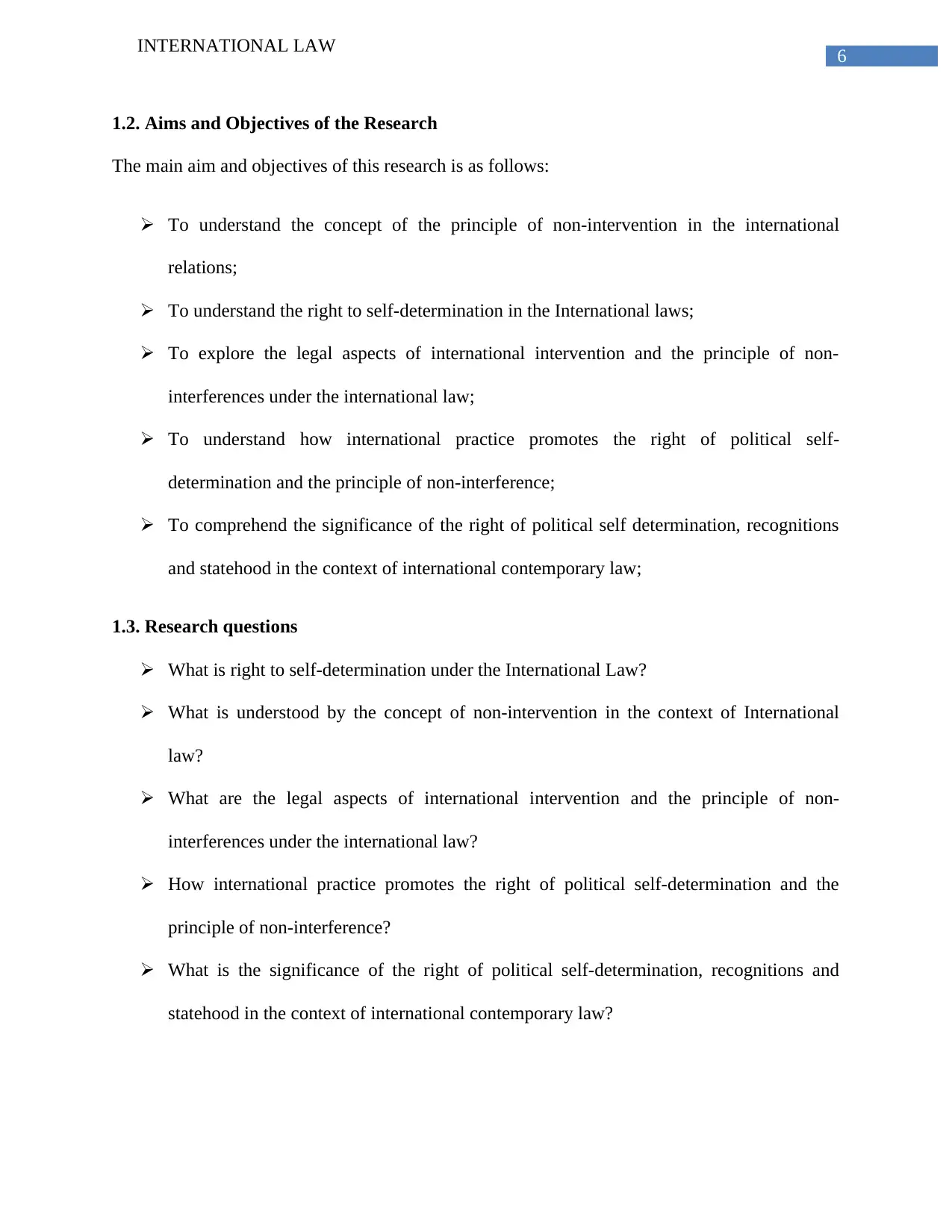
6
INTERNATIONAL LAW
1.2. Aims and Objectives of the Research
The main aim and objectives of this research is as follows:
To understand the concept of the principle of non-intervention in the international
relations;
To understand the right to self-determination in the International laws;
To explore the legal aspects of international intervention and the principle of non-
interferences under the international law;
To understand how international practice promotes the right of political self-
determination and the principle of non-interference;
To comprehend the significance of the right of political self determination, recognitions
and statehood in the context of international contemporary law;
1.3. Research questions
What is right to self-determination under the International Law?
What is understood by the concept of non-intervention in the context of International
law?
What are the legal aspects of international intervention and the principle of non-
interferences under the international law?
How international practice promotes the right of political self-determination and the
principle of non-interference?
What is the significance of the right of political self-determination, recognitions and
statehood in the context of international contemporary law?
INTERNATIONAL LAW
1.2. Aims and Objectives of the Research
The main aim and objectives of this research is as follows:
To understand the concept of the principle of non-intervention in the international
relations;
To understand the right to self-determination in the International laws;
To explore the legal aspects of international intervention and the principle of non-
interferences under the international law;
To understand how international practice promotes the right of political self-
determination and the principle of non-interference;
To comprehend the significance of the right of political self determination, recognitions
and statehood in the context of international contemporary law;
1.3. Research questions
What is right to self-determination under the International Law?
What is understood by the concept of non-intervention in the context of International
law?
What are the legal aspects of international intervention and the principle of non-
interferences under the international law?
How international practice promotes the right of political self-determination and the
principle of non-interference?
What is the significance of the right of political self-determination, recognitions and
statehood in the context of international contemporary law?
Paraphrase This Document
Need a fresh take? Get an instant paraphrase of this document with our AI Paraphraser
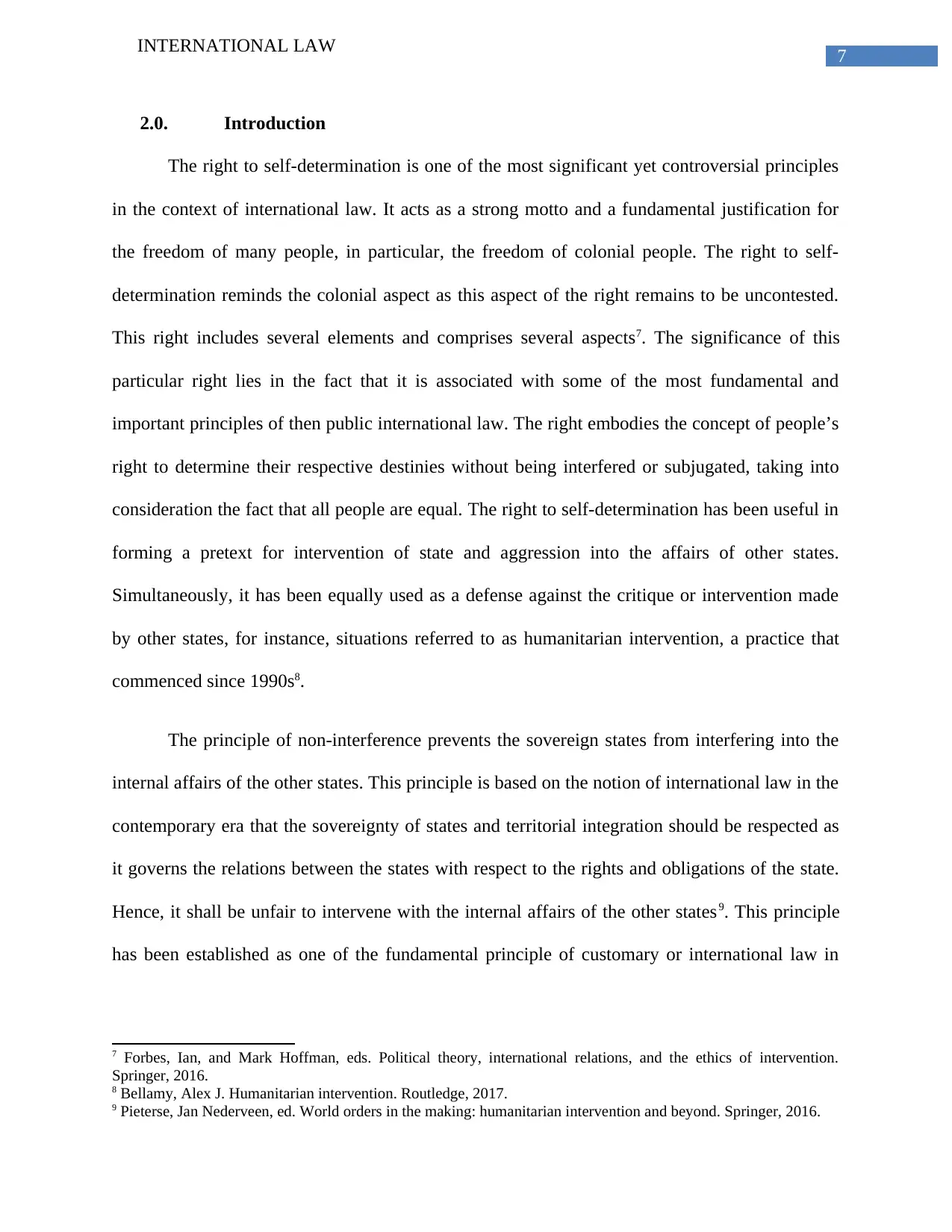
7
INTERNATIONAL LAW
2.0. Introduction
The right to self-determination is one of the most significant yet controversial principles
in the context of international law. It acts as a strong motto and a fundamental justification for
the freedom of many people, in particular, the freedom of colonial people. The right to self-
determination reminds the colonial aspect as this aspect of the right remains to be uncontested.
This right includes several elements and comprises several aspects7. The significance of this
particular right lies in the fact that it is associated with some of the most fundamental and
important principles of then public international law. The right embodies the concept of people’s
right to determine their respective destinies without being interfered or subjugated, taking into
consideration the fact that all people are equal. The right to self-determination has been useful in
forming a pretext for intervention of state and aggression into the affairs of other states.
Simultaneously, it has been equally used as a defense against the critique or intervention made
by other states, for instance, situations referred to as humanitarian intervention, a practice that
commenced since 1990s8.
The principle of non-interference prevents the sovereign states from interfering into the
internal affairs of the other states. This principle is based on the notion of international law in the
contemporary era that the sovereignty of states and territorial integration should be respected as
it governs the relations between the states with respect to the rights and obligations of the state.
Hence, it shall be unfair to intervene with the internal affairs of the other states9. This principle
has been established as one of the fundamental principle of customary or international law in
7 Forbes, Ian, and Mark Hoffman, eds. Political theory, international relations, and the ethics of intervention.
Springer, 2016.
8 Bellamy, Alex J. Humanitarian intervention. Routledge, 2017.
9 Pieterse, Jan Nederveen, ed. World orders in the making: humanitarian intervention and beyond. Springer, 2016.
INTERNATIONAL LAW
2.0. Introduction
The right to self-determination is one of the most significant yet controversial principles
in the context of international law. It acts as a strong motto and a fundamental justification for
the freedom of many people, in particular, the freedom of colonial people. The right to self-
determination reminds the colonial aspect as this aspect of the right remains to be uncontested.
This right includes several elements and comprises several aspects7. The significance of this
particular right lies in the fact that it is associated with some of the most fundamental and
important principles of then public international law. The right embodies the concept of people’s
right to determine their respective destinies without being interfered or subjugated, taking into
consideration the fact that all people are equal. The right to self-determination has been useful in
forming a pretext for intervention of state and aggression into the affairs of other states.
Simultaneously, it has been equally used as a defense against the critique or intervention made
by other states, for instance, situations referred to as humanitarian intervention, a practice that
commenced since 1990s8.
The principle of non-interference prevents the sovereign states from interfering into the
internal affairs of the other states. This principle is based on the notion of international law in the
contemporary era that the sovereignty of states and territorial integration should be respected as
it governs the relations between the states with respect to the rights and obligations of the state.
Hence, it shall be unfair to intervene with the internal affairs of the other states9. This principle
has been established as one of the fundamental principle of customary or international law in
7 Forbes, Ian, and Mark Hoffman, eds. Political theory, international relations, and the ethics of intervention.
Springer, 2016.
8 Bellamy, Alex J. Humanitarian intervention. Routledge, 2017.
9 Pieterse, Jan Nederveen, ed. World orders in the making: humanitarian intervention and beyond. Springer, 2016.
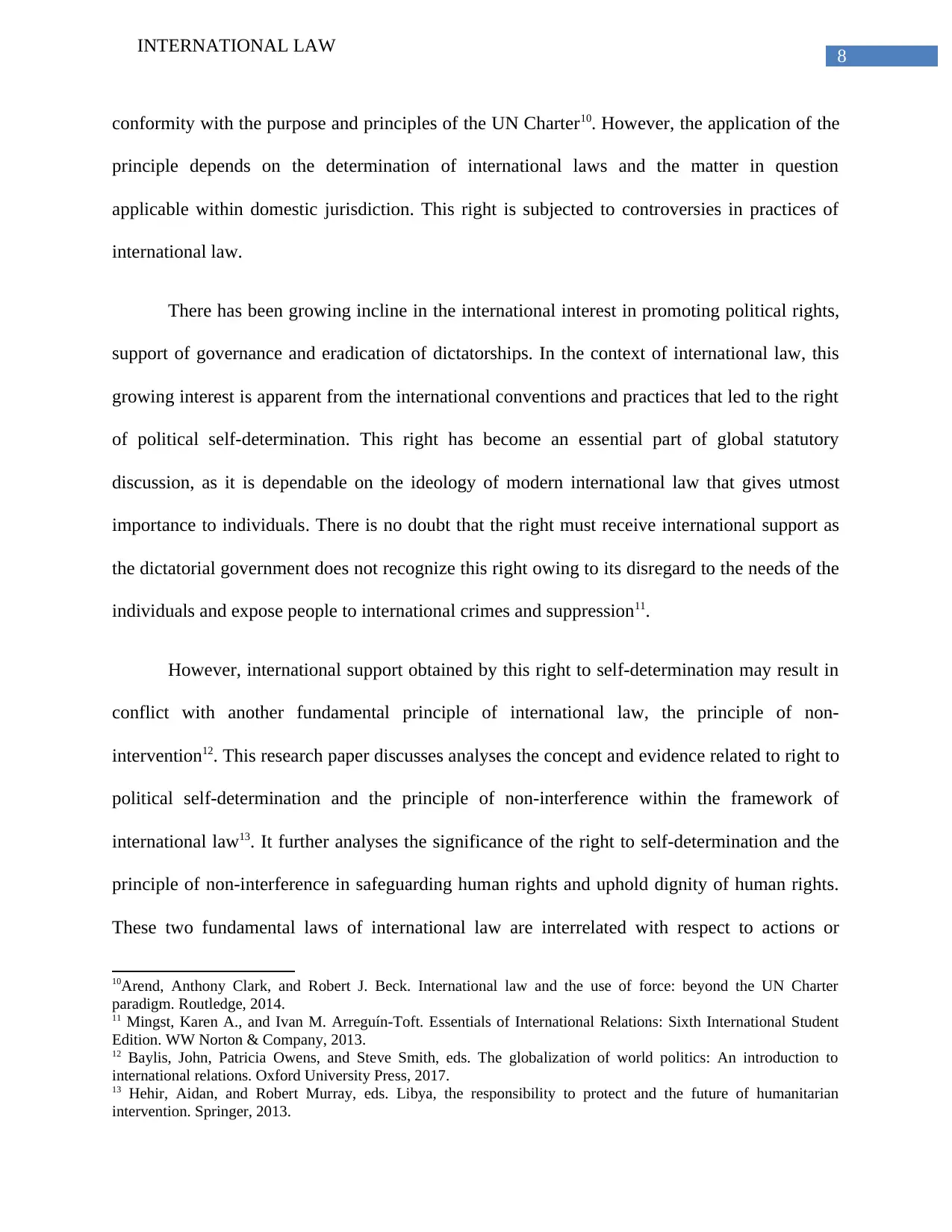
8
INTERNATIONAL LAW
conformity with the purpose and principles of the UN Charter10. However, the application of the
principle depends on the determination of international laws and the matter in question
applicable within domestic jurisdiction. This right is subjected to controversies in practices of
international law.
There has been growing incline in the international interest in promoting political rights,
support of governance and eradication of dictatorships. In the context of international law, this
growing interest is apparent from the international conventions and practices that led to the right
of political self-determination. This right has become an essential part of global statutory
discussion, as it is dependable on the ideology of modern international law that gives utmost
importance to individuals. There is no doubt that the right must receive international support as
the dictatorial government does not recognize this right owing to its disregard to the needs of the
individuals and expose people to international crimes and suppression11.
However, international support obtained by this right to self-determination may result in
conflict with another fundamental principle of international law, the principle of non-
intervention12. This research paper discusses analyses the concept and evidence related to right to
political self-determination and the principle of non-interference within the framework of
international law13. It further analyses the significance of the right to self-determination and the
principle of non-interference in safeguarding human rights and uphold dignity of human rights.
These two fundamental laws of international law are interrelated with respect to actions or
10Arend, Anthony Clark, and Robert J. Beck. International law and the use of force: beyond the UN Charter
paradigm. Routledge, 2014.
11 Mingst, Karen A., and Ivan M. Arreguín-Toft. Essentials of International Relations: Sixth International Student
Edition. WW Norton & Company, 2013.
12 Baylis, John, Patricia Owens, and Steve Smith, eds. The globalization of world politics: An introduction to
international relations. Oxford University Press, 2017.
13 Hehir, Aidan, and Robert Murray, eds. Libya, the responsibility to protect and the future of humanitarian
intervention. Springer, 2013.
INTERNATIONAL LAW
conformity with the purpose and principles of the UN Charter10. However, the application of the
principle depends on the determination of international laws and the matter in question
applicable within domestic jurisdiction. This right is subjected to controversies in practices of
international law.
There has been growing incline in the international interest in promoting political rights,
support of governance and eradication of dictatorships. In the context of international law, this
growing interest is apparent from the international conventions and practices that led to the right
of political self-determination. This right has become an essential part of global statutory
discussion, as it is dependable on the ideology of modern international law that gives utmost
importance to individuals. There is no doubt that the right must receive international support as
the dictatorial government does not recognize this right owing to its disregard to the needs of the
individuals and expose people to international crimes and suppression11.
However, international support obtained by this right to self-determination may result in
conflict with another fundamental principle of international law, the principle of non-
intervention12. This research paper discusses analyses the concept and evidence related to right to
political self-determination and the principle of non-interference within the framework of
international law13. It further analyses the significance of the right to self-determination and the
principle of non-interference in safeguarding human rights and uphold dignity of human rights.
These two fundamental laws of international law are interrelated with respect to actions or
10Arend, Anthony Clark, and Robert J. Beck. International law and the use of force: beyond the UN Charter
paradigm. Routledge, 2014.
11 Mingst, Karen A., and Ivan M. Arreguín-Toft. Essentials of International Relations: Sixth International Student
Edition. WW Norton & Company, 2013.
12 Baylis, John, Patricia Owens, and Steve Smith, eds. The globalization of world politics: An introduction to
international relations. Oxford University Press, 2017.
13 Hehir, Aidan, and Robert Murray, eds. Libya, the responsibility to protect and the future of humanitarian
intervention. Springer, 2013.
⊘ This is a preview!⊘
Do you want full access?
Subscribe today to unlock all pages.

Trusted by 1+ million students worldwide
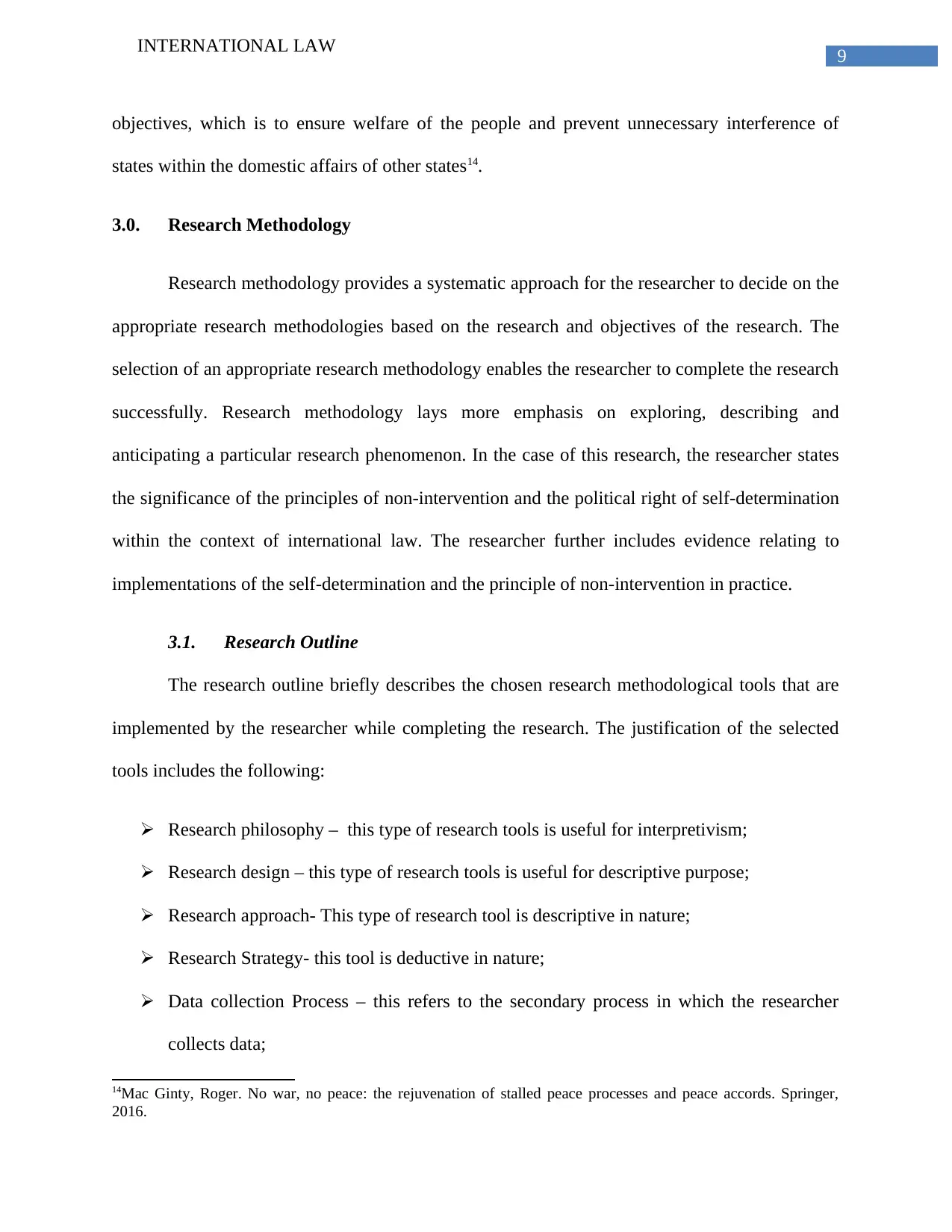
9
INTERNATIONAL LAW
objectives, which is to ensure welfare of the people and prevent unnecessary interference of
states within the domestic affairs of other states14.
3.0. Research Methodology
Research methodology provides a systematic approach for the researcher to decide on the
appropriate research methodologies based on the research and objectives of the research. The
selection of an appropriate research methodology enables the researcher to complete the research
successfully. Research methodology lays more emphasis on exploring, describing and
anticipating a particular research phenomenon. In the case of this research, the researcher states
the significance of the principles of non-intervention and the political right of self-determination
within the context of international law. The researcher further includes evidence relating to
implementations of the self-determination and the principle of non-intervention in practice.
3.1. Research Outline
The research outline briefly describes the chosen research methodological tools that are
implemented by the researcher while completing the research. The justification of the selected
tools includes the following:
Research philosophy – this type of research tools is useful for interpretivism;
Research design – this type of research tools is useful for descriptive purpose;
Research approach- This type of research tool is descriptive in nature;
Research Strategy- this tool is deductive in nature;
Data collection Process – this refers to the secondary process in which the researcher
collects data;
14Mac Ginty, Roger. No war, no peace: the rejuvenation of stalled peace processes and peace accords. Springer,
2016.
INTERNATIONAL LAW
objectives, which is to ensure welfare of the people and prevent unnecessary interference of
states within the domestic affairs of other states14.
3.0. Research Methodology
Research methodology provides a systematic approach for the researcher to decide on the
appropriate research methodologies based on the research and objectives of the research. The
selection of an appropriate research methodology enables the researcher to complete the research
successfully. Research methodology lays more emphasis on exploring, describing and
anticipating a particular research phenomenon. In the case of this research, the researcher states
the significance of the principles of non-intervention and the political right of self-determination
within the context of international law. The researcher further includes evidence relating to
implementations of the self-determination and the principle of non-intervention in practice.
3.1. Research Outline
The research outline briefly describes the chosen research methodological tools that are
implemented by the researcher while completing the research. The justification of the selected
tools includes the following:
Research philosophy – this type of research tools is useful for interpretivism;
Research design – this type of research tools is useful for descriptive purpose;
Research approach- This type of research tool is descriptive in nature;
Research Strategy- this tool is deductive in nature;
Data collection Process – this refers to the secondary process in which the researcher
collects data;
14Mac Ginty, Roger. No war, no peace: the rejuvenation of stalled peace processes and peace accords. Springer,
2016.
Paraphrase This Document
Need a fresh take? Get an instant paraphrase of this document with our AI Paraphraser
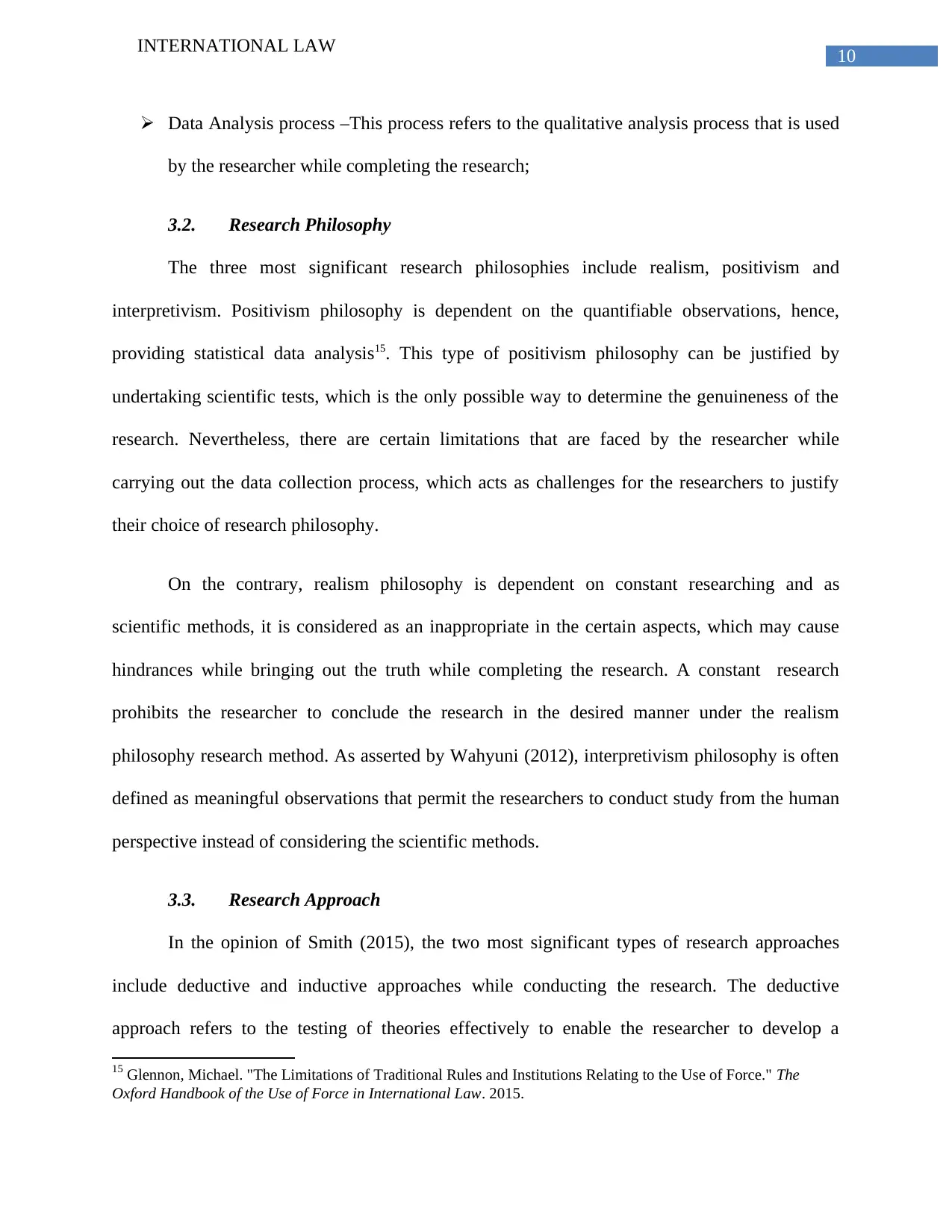
10
INTERNATIONAL LAW
Data Analysis process –This process refers to the qualitative analysis process that is used
by the researcher while completing the research;
3.2. Research Philosophy
The three most significant research philosophies include realism, positivism and
interpretivism. Positivism philosophy is dependent on the quantifiable observations, hence,
providing statistical data analysis15. This type of positivism philosophy can be justified by
undertaking scientific tests, which is the only possible way to determine the genuineness of the
research. Nevertheless, there are certain limitations that are faced by the researcher while
carrying out the data collection process, which acts as challenges for the researchers to justify
their choice of research philosophy.
On the contrary, realism philosophy is dependent on constant researching and as
scientific methods, it is considered as an inappropriate in the certain aspects, which may cause
hindrances while bringing out the truth while completing the research. A constant research
prohibits the researcher to conclude the research in the desired manner under the realism
philosophy research method. As asserted by Wahyuni (2012), interpretivism philosophy is often
defined as meaningful observations that permit the researchers to conduct study from the human
perspective instead of considering the scientific methods.
3.3. Research Approach
In the opinion of Smith (2015), the two most significant types of research approaches
include deductive and inductive approaches while conducting the research. The deductive
approach refers to the testing of theories effectively to enable the researcher to develop a
15 Glennon, Michael. "The Limitations of Traditional Rules and Institutions Relating to the Use of Force." The
Oxford Handbook of the Use of Force in International Law. 2015.
INTERNATIONAL LAW
Data Analysis process –This process refers to the qualitative analysis process that is used
by the researcher while completing the research;
3.2. Research Philosophy
The three most significant research philosophies include realism, positivism and
interpretivism. Positivism philosophy is dependent on the quantifiable observations, hence,
providing statistical data analysis15. This type of positivism philosophy can be justified by
undertaking scientific tests, which is the only possible way to determine the genuineness of the
research. Nevertheless, there are certain limitations that are faced by the researcher while
carrying out the data collection process, which acts as challenges for the researchers to justify
their choice of research philosophy.
On the contrary, realism philosophy is dependent on constant researching and as
scientific methods, it is considered as an inappropriate in the certain aspects, which may cause
hindrances while bringing out the truth while completing the research. A constant research
prohibits the researcher to conclude the research in the desired manner under the realism
philosophy research method. As asserted by Wahyuni (2012), interpretivism philosophy is often
defined as meaningful observations that permit the researchers to conduct study from the human
perspective instead of considering the scientific methods.
3.3. Research Approach
In the opinion of Smith (2015), the two most significant types of research approaches
include deductive and inductive approaches while conducting the research. The deductive
approach refers to the testing of theories effectively to enable the researcher to develop a
15 Glennon, Michael. "The Limitations of Traditional Rules and Institutions Relating to the Use of Force." The
Oxford Handbook of the Use of Force in International Law. 2015.
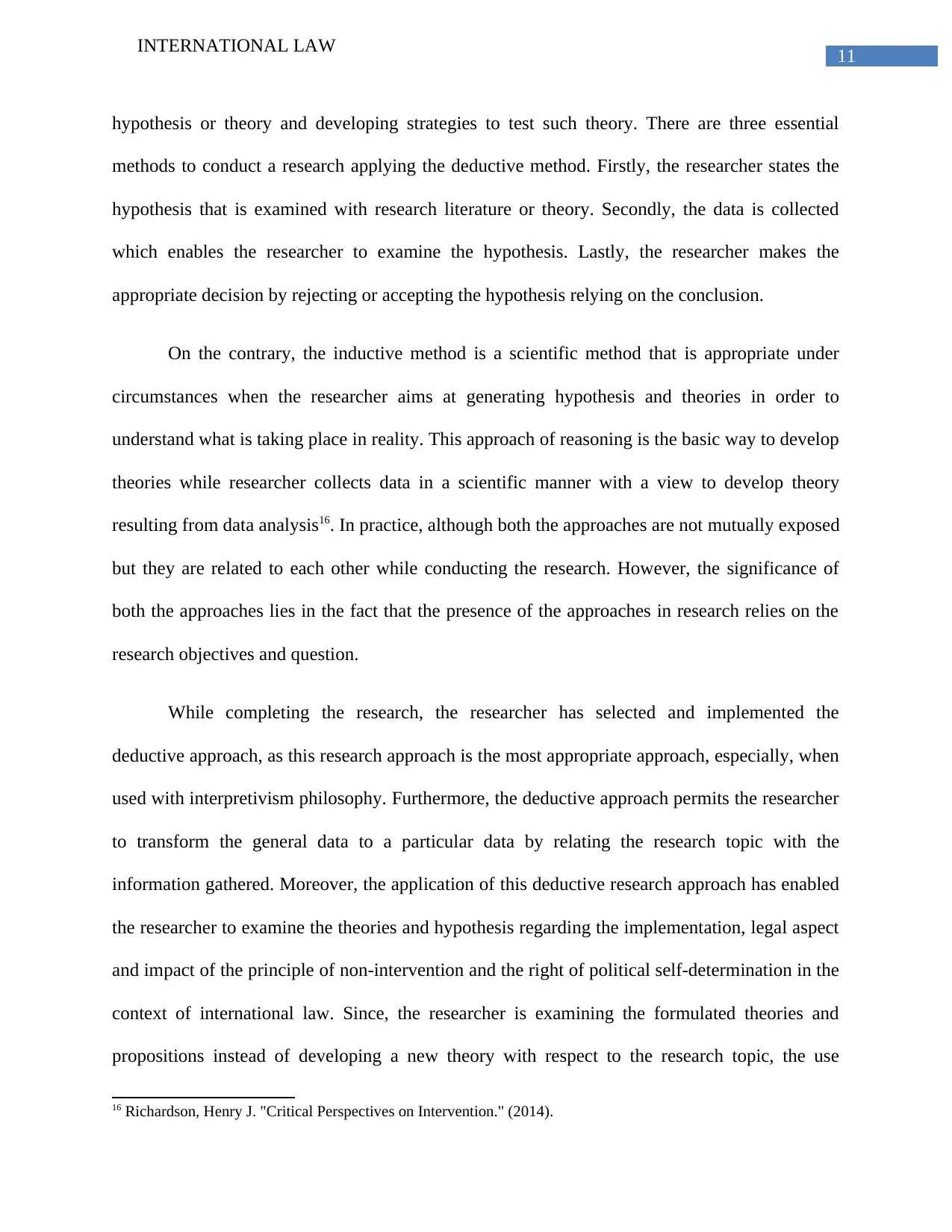
11
INTERNATIONAL LAW
hypothesis or theory and developing strategies to test such theory. There are three essential
methods to conduct a research applying the deductive method. Firstly, the researcher states the
hypothesis that is examined with research literature or theory. Secondly, the data is collected
which enables the researcher to examine the hypothesis. Lastly, the researcher makes the
appropriate decision by rejecting or accepting the hypothesis relying on the conclusion.
On the contrary, the inductive method is a scientific method that is appropriate under
circumstances when the researcher aims at generating hypothesis and theories in order to
understand what is taking place in reality. This approach of reasoning is the basic way to develop
theories while researcher collects data in a scientific manner with a view to develop theory
resulting from data analysis16. In practice, although both the approaches are not mutually exposed
but they are related to each other while conducting the research. However, the significance of
both the approaches lies in the fact that the presence of the approaches in research relies on the
research objectives and question.
While completing the research, the researcher has selected and implemented the
deductive approach, as this research approach is the most appropriate approach, especially, when
used with interpretivism philosophy. Furthermore, the deductive approach permits the researcher
to transform the general data to a particular data by relating the research topic with the
information gathered. Moreover, the application of this deductive research approach has enabled
the researcher to examine the theories and hypothesis regarding the implementation, legal aspect
and impact of the principle of non-intervention and the right of political self-determination in the
context of international law. Since, the researcher is examining the formulated theories and
propositions instead of developing a new theory with respect to the research topic, the use
16 Richardson, Henry J. "Critical Perspectives on Intervention." (2014).
INTERNATIONAL LAW
hypothesis or theory and developing strategies to test such theory. There are three essential
methods to conduct a research applying the deductive method. Firstly, the researcher states the
hypothesis that is examined with research literature or theory. Secondly, the data is collected
which enables the researcher to examine the hypothesis. Lastly, the researcher makes the
appropriate decision by rejecting or accepting the hypothesis relying on the conclusion.
On the contrary, the inductive method is a scientific method that is appropriate under
circumstances when the researcher aims at generating hypothesis and theories in order to
understand what is taking place in reality. This approach of reasoning is the basic way to develop
theories while researcher collects data in a scientific manner with a view to develop theory
resulting from data analysis16. In practice, although both the approaches are not mutually exposed
but they are related to each other while conducting the research. However, the significance of
both the approaches lies in the fact that the presence of the approaches in research relies on the
research objectives and question.
While completing the research, the researcher has selected and implemented the
deductive approach, as this research approach is the most appropriate approach, especially, when
used with interpretivism philosophy. Furthermore, the deductive approach permits the researcher
to transform the general data to a particular data by relating the research topic with the
information gathered. Moreover, the application of this deductive research approach has enabled
the researcher to examine the theories and hypothesis regarding the implementation, legal aspect
and impact of the principle of non-intervention and the right of political self-determination in the
context of international law. Since, the researcher is examining the formulated theories and
propositions instead of developing a new theory with respect to the research topic, the use
16 Richardson, Henry J. "Critical Perspectives on Intervention." (2014).
⊘ This is a preview!⊘
Do you want full access?
Subscribe today to unlock all pages.

Trusted by 1+ million students worldwide
1 out of 61
Your All-in-One AI-Powered Toolkit for Academic Success.
+13062052269
info@desklib.com
Available 24*7 on WhatsApp / Email
![[object Object]](/_next/static/media/star-bottom.7253800d.svg)
Unlock your academic potential
Copyright © 2020–2026 A2Z Services. All Rights Reserved. Developed and managed by ZUCOL.


